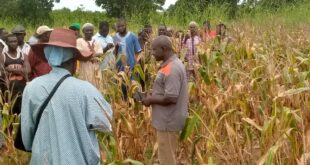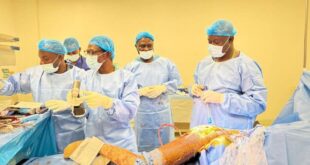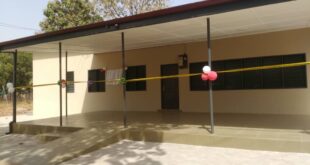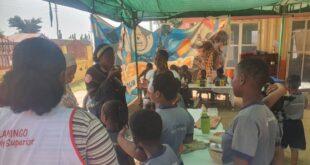Walewale, Ghana – Across local communities in the North East Region of Ghana especially those under the West Mamprusi Municipality and the Mamprugu Moaduri District, many farmers work hard to improve their farm yields through the use of organic agriculture measures.
Unfortunately, the efforts of these farmers are continuously being hampered by negative climate change impacts. For instance, in 2021 many farmers suffered severe food losses due to climate change variability effects such as drought and flood.
Due to the severe drought and floods which was further compounded by the opening of the Bagri and Kompienga Dams in neighbouring Burkina Faso, most of these hard working farmers who had farms in low-lying areas suffered serious losses. Crops that were at their immature growth stage and needed more water to mature suffered severe drought for many weeks whereas those that had fully matured and were due for harvesting, were swept away by flood.
As a result of the unfortunate environmental catastrophes that these farmers experienced last year leading to loss of their crops, many households in the West Mamprusi and Mamprugu Moaduri areas are experiencing extreme hunger according to the Walewale based Centre for Ecological Agriculture and Livelihood (CEAL).
To cushion and relief these households who are predominantly peasant farmers, CEAL through its strategic community development partner, ELPG-Netherlands has procured and distributed 100kg size of 143 bags of maize to 143 households in the West Mamprusi Municipality and Mamprugu Moaduri District.
According to Executive Director of CEAL, Jobila Issifu Sulemana, through this food ration initiative which targeted an estimated average family household size of 7 individuals, “we have been able to put smiles on the faces of about 1,001 individuals in our local communities in the last two months.
Climate change is real and is hitting our local economy very hard: undermining our local communities livelihood supporting systems, setting up chains of events that derail farmers efforts and make our farmers, both men and women, poorer.”
The quality of life of these farmers is further worsened by the current high cost of living crisis being experienced across the country as prices of food and other basic household items keeps on soaring on a daily basis.
He told this reporter, that “In order to reach out to the very poor and vulnerable in our local communities, CEAL simply identified the affected households and served each of them directly through household heads. Those considered include farmer households headed by females, widows, and persons living with disabilities, diseases and other community members who are without any social supporting systems.”
Through this support, the identified farmers and their families are now able to meet their daily square meals and generate the needed energy to enable them work on their farms to improve food security, nutrition and household income security as they move towards the beginning of the 2022 harvesting season in September.
By SavannahNewsOnline.Com/Philip Liebs
 Savannah News Online Reporting Only What Matters Most
Savannah News Online Reporting Only What Matters Most



